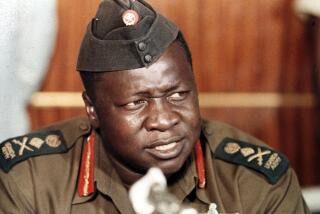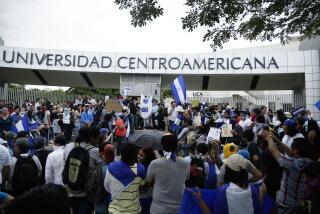‘Oxford of E. Africa’ Tries to Rise Again : Uganda’s Esteemed Makerere University Crippled by Amin’s Terror, Neglect, War
- Share via
KAMPALA, Uganda — Once esteemed as the Oxford of East Africa, Makerere University is struggling to regain an academic prestige that was destroyed during the chaotic rule of dictator Idi Amin in the 1970s.
The challenges faced by Uganda’s only university have included replacing slain staff members, reassuring faculty who had fled into exile, renovating buildings neglected for a decade and reviving a school spirit shaken by repression and war.
The oldest, and for years the most prominent, university in East Africa, Makerere began its decline in 1971 with the start of Amin’s eight-year reign. The university received minimal support during that period, and in 1976 generated the largest anti-government protests in Uganda under Amin’s rule.
Even Amin’s ouster and flight into exile in 1979 did not bring quick revival to the picturesque hilltop campus in Kampala. Funds remained scarce; most of the exiles stayed away, and there has been almost constant civil and anti-government warfare since 1981.
Missing Students, Faculty
Bernard Onyango, the university’s registrar, said more than 1,000 of the 7,000 students admitted for the 1985-86 year were unable to reach Kampala because roads linking the capital to the guerrilla-held southwest were closed. Roughly a third of the more than 600 faculty posts remain vacant, because of the fighting and salaries that lag 25% to 50% behind Makerere’s counterparts elsewhere in Africa.
Since Onyango commented, the government has signed a cease-fire with the rebels, but widespread concern remains about whether the pact will be fully implemented.
In any case, the university faces continuing shortages of basic academic items, such as books and laboratory supplies. It has been forced to trim the freshman class at its medical school from 110 to 70 because of inadequate equipment and a lack of faculty.
Only now, with help from a European Common Market grant, are kitchen stoves operating with gas or electricity after years of school cooks’ preparing meals on charcoal braziers. Resident students are still doubled or tripled up in rooms designed for one.
Established in 1922 as a technical school, Makerere grew steadily and by the 1950s was drawing students from throughout East and Central Africa. It was a pace-setter in appointing Africans to its faculty, had a renowned social sciences institute and attracted distinguished professors from other continents.
Its alumni include former President Julius K. Nyerere of Tanzania, Vice President Mwai Kibaki of Kenya, former Prime Minister Elijah Mudenda of Zambia; novelists Ngugi wa Thiongo of Kenya and Malawi’s David Rubadiri, and dozens of leading African doctors, scholars and civil servants.
The influx of foreign students virtually halted during the Amin years, and scores of expatriate and Ugandan professors left the country. Some feared for their lives; others were fed up with deteriorating facilities and salaries rendered meaningless by inflation.
“In 1979, when Amin was ousted, we hoped that many senior people would come back,” Onyango said. “Unfortunately, not many did.
“There are lots of Ugandan academics all over the world. If even a quarter of them came back, the university would improve.”
Some advances have been made in the last few years. A business college and teachers college have been added, and an exchange program has been proposed with Italy’s Pavia University.
On the tree-shaded campus, the troubles of Makerere and Uganda seem remote. One recent sunny afternoon, a student choir was practicing, a table tennis tournament was under way, posters in the whitewashed administration building announced forthcoming political debates.
“We are all pleasantly surprised to see the condition of student morale,” said the deputy vice chancellor, A.G. Ginyera-Pinchwa. “We thought they would be depressed because of the war, but they take their studies seriously, and there are more out-of-class activities going on than ever before.”
During Amin’s rule, the student government went underground because its leaders believed they could not function freely.
Vice Chancellor Frank Kalimuzo disappeared in 1972 after provoking Amin’s wrath. In 1976, secret police shot and killed law student Paul Serwanga and dragged away the leader of a women’s dormitory, Nanziri Bukenya. Her body was found later in the countryside.
Makerere students staged two major protests in 1976. The first spread into downtown Kampala and was joined by thousands of non-students. The second was confined to the campus and brutally broken up by security forces.
That year Amin, who as head of state held the title of university chancellor, received an honorary degree from Makerere.
The citation read, “Field Marshal Amin has restored law and order, contained armed robbery and made Ugandans live their lives free of fear.”
More to Read
Sign up for Essential California
The most important California stories and recommendations in your inbox every morning.
You may occasionally receive promotional content from the Los Angeles Times.












